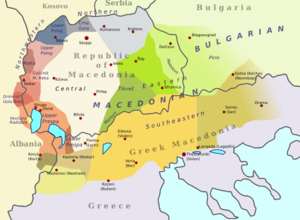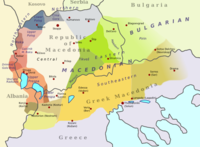| Revision as of 13:51, 10 April 2009 editTXiKiBoT (talk | contribs)567,654 editsm robot Modifying: bg:Битолски говор← Previous edit |
Revision as of 05:38, 21 May 2009 edit undoSmackBot (talk | contribs)3,734,324 editsm Standard headings/general fixesNext edit → |
| Line 1: |
Line 1: |
|
] |
|
] |
|
|
|
|
|
The '''Prilep-Bitola dialect''' ({{lang-mk|Прилепско-битолски дијалект}}, ''Prilepsko-bitolski dijalekt'') is a member of the central subgroup of the western group of ] of the ]. This dialect is mainly spoken in the towns of ] and ] and in surrounding areas in the ], as well as by the ] population in and around ] (Lerin)<ref>'''author missing'''. Леринскиот говор. Македонски jазик, 1983, ХХХIV, стр. 23-49.</ref><ref>Hill, Peter. The Dialect of Gorno Kalenik 1991, Columbus, OH</ref> in neighbouring ]. The Prilep-Bitola dialect, along with other peripheral west-central dialects, provides much of the basis for modern ].<ref>Makedonska gramatika by Krume Kepeski |
|
The '''Prilep-Bitola dialect''' ({{lang-mk|Прилепско-битолски дијалект}}, ''Prilepsko-bitolski dijalekt'') is a member of the central subgroup of the western group of ] of the ]. This dialect is mainly spoken in the towns of ] and ] and in surrounding areas in the ], as well as by the ] population in and around ] (Lerin)<ref>'''author missing'''. Леринскиот говор. Македонски jазик, 1983, ХХХIV, стр. 23-49.</ref><ref>Hill, Peter. The Dialect of Gorno Kalenik 1991, Columbus, OH</ref> in neighbouring ]. The Prilep-Bitola dialect, along with other peripheral west-central dialects, provides much of the basis for modern ].<ref>Makedonska gramatika by Krume Kepeski |
|
Language, Vol. 27, No. 2 (Apr. - Jun., 1951), pp. 180-187</ref> |
|
Language, Vol. 27, No. 2 (Apr. - Jun., 1951), pp. 180-187</ref> |
|
|
|
|
| Line 7: |
Line 7: |
|
|
|
|
|
The phonological characteristics of the Prilep-Bitola dialect which also can also be found in the other peripheral dialects are: |
|
The phonological characteristics of the Prilep-Bitola dialect which also can also be found in the other peripheral dialects are: |
|
*] word stress (see ]) |
|
*] word stress (see ]) |
|
*the ] has reflexed into {{IPA|}} |
|
*the ] has reflexed into {{IPA|}} |
|
*absence of the {{IPA|}} group in third-person singular verbs (e.g. можи and биди versus the standard може and биде) |
|
*absence of the {{IPA|}} group in third-person singular verbs (e.g. можи and биди versus the standard може and биде) |
| Line 32: |
Line 32: |
|
|
|
|
|
==Notes== |
|
==Notes== |
|
|
{{reflist}} |
|
<div class="references-small"> |
|
|
<references /> |
|
|
</div> |
|
|
|
|
| ⚫ |
==External Links== |
|
|
|
|
|
|
⚫ |
==External links== |
|
* |
|
* |
|
|
|
|
The phonological characteristics of the Prilep-Bitola dialect which also can also be found in the other peripheral dialects are:

